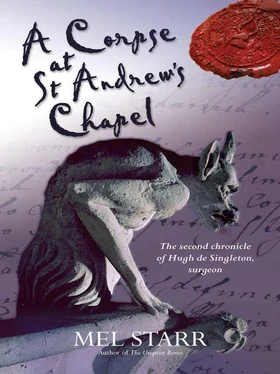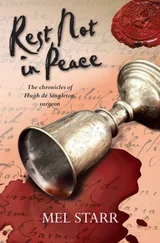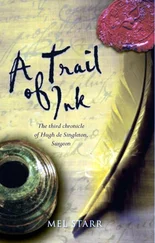Mel Starr - A Corpse at St Andrew's Chapel
Здесь есть возможность читать онлайн «Mel Starr - A Corpse at St Andrew's Chapel» весь текст электронной книги совершенно бесплатно (целиком полную версию без сокращений). В некоторых случаях можно слушать аудио, скачать через торрент в формате fb2 и присутствует краткое содержание. Год выпуска: 2010, Издательство: Kregel Publications, Жанр: Исторический детектив, на английском языке. Описание произведения, (предисловие) а так же отзывы посетителей доступны на портале библиотеки ЛибКат.
- Название:A Corpse at St Andrew's Chapel
- Автор:
- Издательство:Kregel Publications
- Жанр:
- Год:2010
- ISBN:нет данных
- Рейтинг книги:5 / 5. Голосов: 1
-
Избранное:Добавить в избранное
- Отзывы:
-
Ваша оценка:
- 100
- 1
- 2
- 3
- 4
- 5
A Corpse at St Andrew's Chapel: краткое содержание, описание и аннотация
Предлагаем к чтению аннотацию, описание, краткое содержание или предисловие (зависит от того, что написал сам автор книги «A Corpse at St Andrew's Chapel»). Если вы не нашли необходимую информацию о книге — напишите в комментариях, мы постараемся отыскать её.
A Corpse at St Andrew's Chapel — читать онлайн бесплатно полную книгу (весь текст) целиком
Ниже представлен текст книги, разбитый по страницам. Система сохранения места последней прочитанной страницы, позволяет с удобством читать онлайн бесплатно книгу «A Corpse at St Andrew's Chapel», без необходимости каждый раз заново искать на чём Вы остановились. Поставьте закладку, и сможете в любой момент перейти на страницу, на которой закончили чтение.
Интервал:
Закладка:
With the blade in my left hand to open the wound I took forceps in my right hand and found the end of the embedded splinter. The first tug was unsuccessful. The forceps slipped from the gristle. I found the fragment again, grasped the thing more tightly, and pulled.
A sliver near the size of my little finger came out from under the stationer’s rib. He gasped and his legs jerked, but he did not cry out. He is a person of great fortitude, as is his daughter. She watched the process from beginning to end without blanching.
I took the offending fragment, still held tight in my forceps, to the end of the table and held it before the stationer’s watering eyes. “This was lodged beneath a rib,” I explained.
Caxton raised his head to inspect the fragment. “Much thanks,” he whispered.
“I will stitch the wound and you will soon be good as new.”
I requested more wine from Kate, and threaded a needle while she ran to fetch it. I closed the wound with fourteen stitches, bathed the cut in wine, and when I was done assisted Caxton to a sitting position on the table.
“’Tis improved already,” he exclaimed. “Will you dress it now?”
I was again required to explain that I follow the practice of Henry de Mondeville, who taught that wounds heal best when dry and uncovered. Aside from the occasional poultice of egg albumin, a wound left open mends most readily. I know that this practice contradicts the ancients and the university physicians, but de Mondeville saw his method work in practice. I am a Baliol man, so I should not write this; perhaps the books are wrong.
Caxton seemed unconvinced of this, but as I had been successful thus far in dealing with his affliction he made no objection. His daughter helped him into kirtle and cotehardie, we dragged the table back into the workroom, and we were done. And just in time. The sky was clearing as evening drew near, and the sun was dropping behind the rooftops to the west of the toft as I completed the needlework on the stationer’s back.
I made my way through darkening streets to New Canterbury Hall. I hoped Master John might invite me to occupy the empty room which had been my home two nights earlier. The porter recognized me, for it was not yet dark enough that my features were obscured, and sent me unaccompanied to Master John’s chamber.
A dim glow through the window told me that the scholar was within. I rapped upon his door and heard from the other side a bench scrape across the flags. Wyclif drew open the door, his brow furrowed. Behind him a book lay open on a table, under a sputtering cresset. He was clearly annoyed at being disturbed in his study. But then he recognized me in the gloom and a smile washed the frown from his face. Well, I assume it did. Master John’s beard obscured his mouth quite thoroughly, but his knitted brow relaxed and he greeted me warmly.
“Master Hugh?”
“Aye…my profession called me to return to Oxford.”
“Surgery? Come in and tell me of it.”
Wyclif shoved the heavy door closed and drew me to the table where he pulled up a second bench and motioned for me to sit. He took his former place, and studied me across the cresset.
“Now then,” he said, “what work have you done this day?”
“I took heed of your advice when we last parted, and sought parchment and ink of the new stationer on the Holywell Street.”
“Ah, did you so?” The scholar’s eyes crinkled. “Did you find the wares agreeable?”
“Indeed. There is much agreeable about the place.”
“I thought you might find it so.”
“The stationer was ill disposed,” I told him.
“Oh? He seems congenial enough when I call.”
“Aye. His affliction distressed him but did not cause him to distress others.”
“And what of this affliction?”
I told Master John of the stationer’s injury and the surgery I had performed that day. His eyes glowed in the cresset as I related the tale. There are some who dislike hearing of wounds and blood. Wyclif is not such a one. He listened intently, and questioned me twice about the procedure.
“And Caxton’s daughter stood at his head the while?” he asked.
“She did…held firm to her father’s hands as I worked.”
“A remarkable lass,” Master John observed. “Do you not agree?”
“Aye. And others find it so, as well. It was as you suggested, I should find the stationer’s shop by the students at his door. There were three as I entered Tuesday.”
“She does no harm to her father’s business, I think,” Wyclif observed.
“You suggest that parchment and ink are not enough to attract an Oxford youth?”
“Enough? What is ever enough?”
“A good meal taken in a hall with pleasant companions,” I asserted. “Is that not enough for a man?”
“Hmmm,” Wyclif shrugged and pursed his lips. “For a time…but you would not refuse such a feast were it offered again next day.”
“Then the labors of the mind; are they not enough for a man?”
“For some, perhaps.”
“For you?” I probed.
“Ha. You think me immune to the charms of the stationer’s daughter?”
“Kate…Katherine?”
“Yes. I heard her name spoken once. I will tell you, Hugh, were I married I would yet enjoy my books. Now I am wed to books…can I not enjoy the sight of a pretty maid?”
“Do not carry the parallel too far, Master John.”
“Nay,” he laughed. “All analogies eventually break down, useful as they may be.”
“Do not your books grow tiresome?”
“Sometimes…as I suppose a beautiful woman may also grow tiresome be she of an ill-favored character.”
“What of the stationer’s daughter?” I asked.
“Kate?” He smiled. “She seems a pleasant lass…not only to the eye, I mean.”
“So I think, although I’ve met her only twice.” I laughed then, which Master John must have thought out of place, for he pursed his lips and his brow lowered. “Here we sit,” I explained, “talking of a comely maid as if we sat in the din of the Stag and Hounds. Surely this is a topic in the air of that establishment as we speak.”
“No doubt,” he smiled, “and perhaps the same lass be under consideration.”
I could not say why at that moment, but the thought of Kate Caxton as a subject for discussion in the Stag and Hounds caused me some unease.
“Perhaps,” I agreed. “’Tis safer to speak of a lass than politics or religion.”
“Aye. Few have lost their heads for commenting on a lady’s face or form.”
“Unless a noble husband or father be near and take offence,” I offered.
“Just so,” the scholar smiled.
Wyclif had pushed his book aside to clear the table before us. I glanced at the volume, still open, and saw that it was a book of Old Testament prophets. Master John followed my gaze and answered my unspoken question.
“Habakkuk…a minor prophet not often studied. But I find all scripture profitable. It speaks to those who will listen.”
“I have never read this prophet,” I admitted. “What does he say?”
“He lived in troublous times…much like our own. Listen as he speaks to God.” Wyclif bent over his book, turned back a page, and ran a finger down the lines. “Why do you show me iniquity, and cause me to see trouble? For plundering and violence are before me; there is strife, and contention arises. Therefore the law is powerless, and justice never goes forth. For the wicked surround the righteous; therefore perverse judgment proceeds.”
The scholar raised his eyes to mine. “God speaks to me in this passage. Does He not to you?”
“Aye. Iniquity, trouble, plundering, violence, strife, contention…such is the world. My position requires me to deal with these ills. Does God supply a remedy for the prophet? Has he a word from God?”
Читать дальшеИнтервал:
Закладка:
Похожие книги на «A Corpse at St Andrew's Chapel»
Представляем Вашему вниманию похожие книги на «A Corpse at St Andrew's Chapel» списком для выбора. Мы отобрали схожую по названию и смыслу литературу в надежде предоставить читателям больше вариантов отыскать новые, интересные, ещё непрочитанные произведения.
Обсуждение, отзывы о книге «A Corpse at St Andrew's Chapel» и просто собственные мнения читателей. Оставьте ваши комментарии, напишите, что Вы думаете о произведении, его смысле или главных героях. Укажите что конкретно понравилось, а что нет, и почему Вы так считаете.












